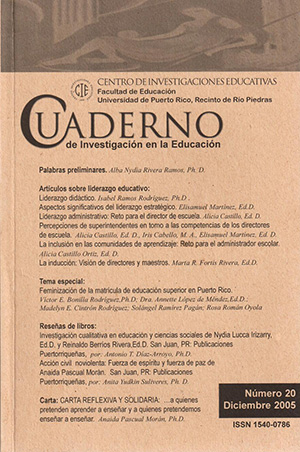Abstract
This study represents a collaborative effort among the Educational Research Center of the College of Education at the Rio Piedras Campus, the Higher Education Council, and the UNESCO International Institute for Higher Education in Latin America and the Caribbean. The results, specific to Puerto Rico, contribute to the effort in collecting information on the feminization of the higher education registration rates in Latin America and the Caribbean. The objectives were: 1) gather higher education institutions registration and graduation data of the last 25 years classified bye quinquennia and 2) analyze the data and evaluate possible educational, economic, and social effects in he behavior of the registration, graduation rates, and the workforce, emphasizing their relationship with gender and academic level. The situation in Puerto Rico is compared to other countries and suggestions are provided for future studies.
How to cite:
Bonilla-Rodríguez, V., López de Méndez, A., Cintrón-Rodríguez, M., Ramírez-Pagán, S., & Román-Oyola, R. (2005). Feminización de la matrícula de educación superior en Puerto Rico. Cuaderno de Investigación en la Educación, 20, 114-153. Retrieved from https://revistas.upr.edu/index.php/educacion/article/view/16269
The contents published in the Puerto Rico Journal of Education is freely distributed under open access practices, in accordance with the Creative Commons license, Attribution-NonCommercial 4.0 International (CC BY-NC 4.0). Through these principles, the journal and its authors allow readers to access, reproduce and share articles in full text. Users should give credit to authors in a reasonable way without suggesting they have their support. Under no circumstances, readers may make use of the contents for commercial purposes. The authors retain copyright on their works.

